人教版(新课程标准) 必修一 Unit 3 Travel journal 阅读课件( 55张ppt)
文档属性
| 名称 | 人教版(新课程标准) 必修一 Unit 3 Travel journal 阅读课件( 55张ppt) |
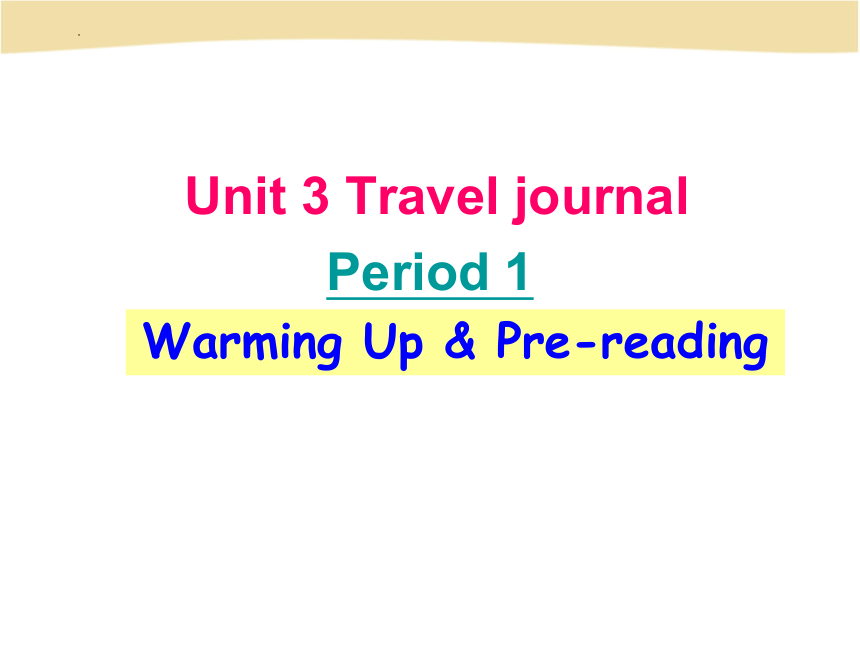
|
|
| 格式 | pptx | ||
| 文件大小 | 5.3MB | ||
| 资源类型 | 教案 | ||
| 版本资源 | 人教版(新课程标准) | ||
| 科目 | 英语 | ||
| 更新时间 | 2022-11-02 23:21:52 | ||
图片预览

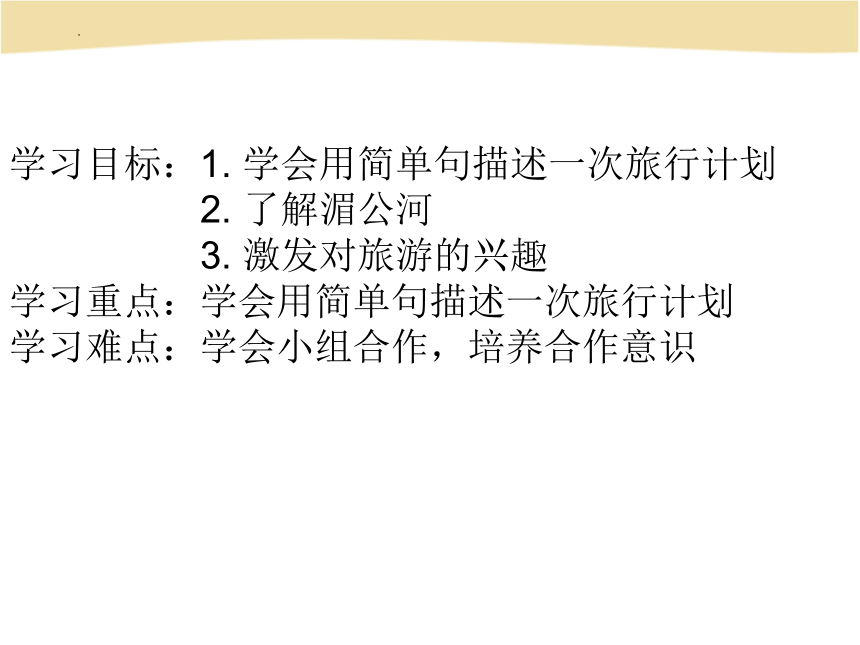

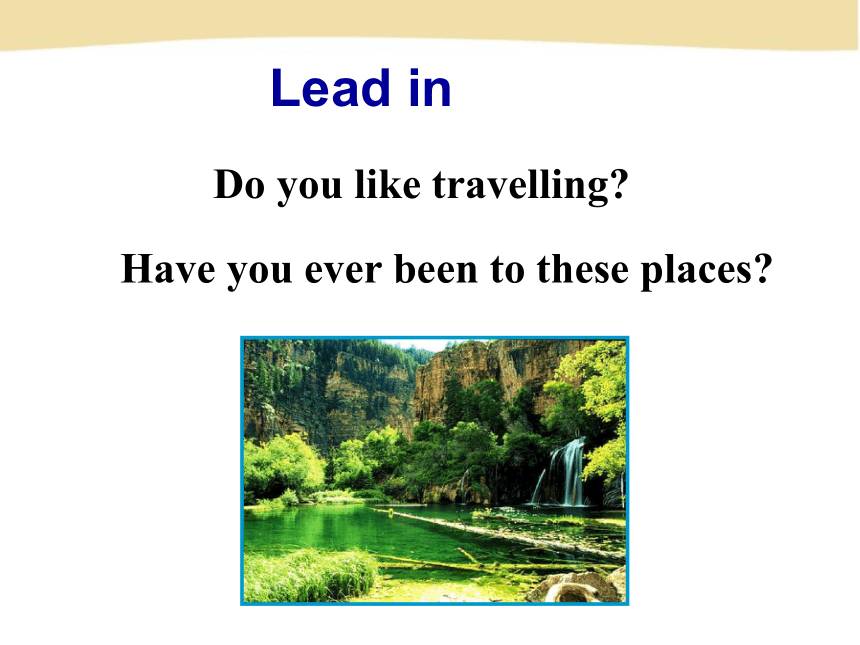
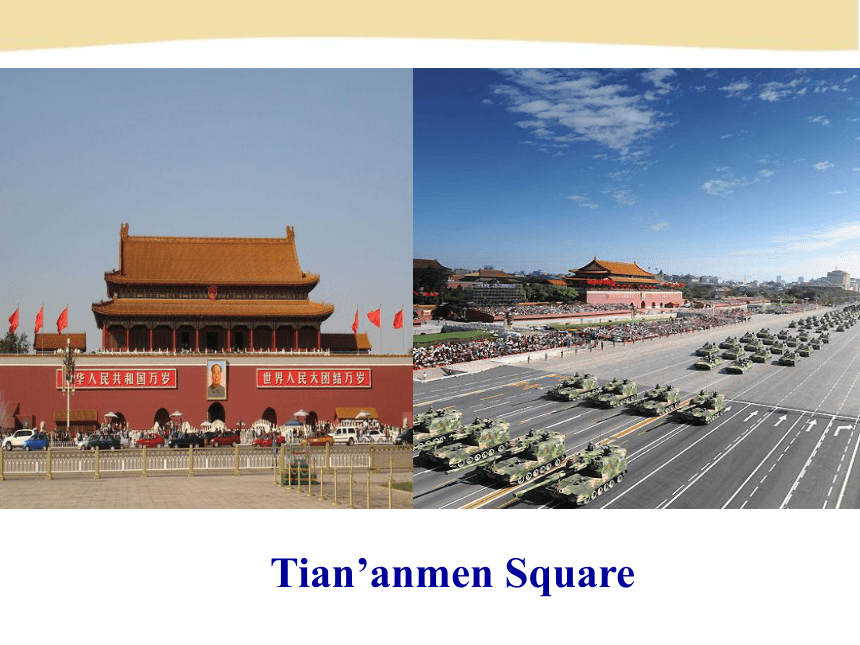

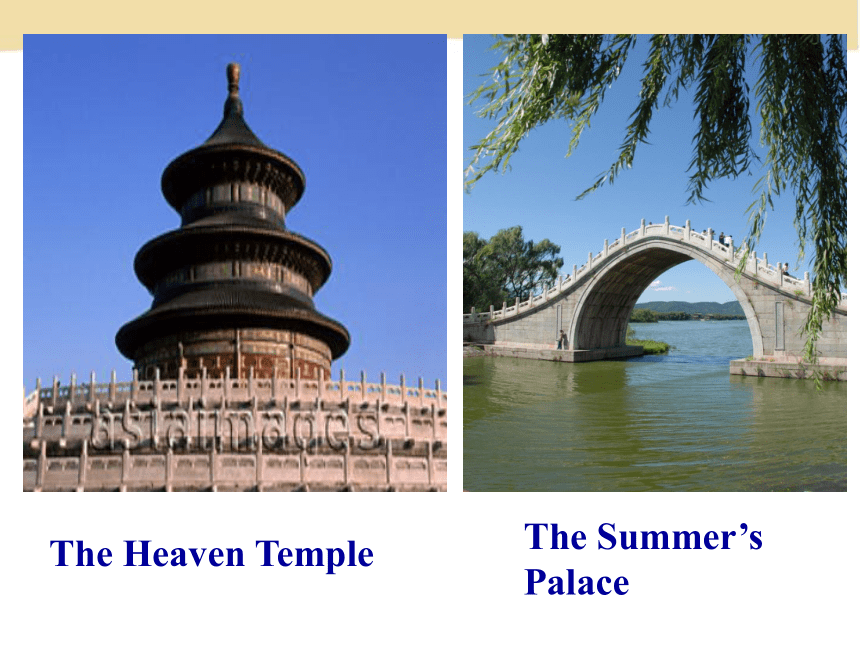
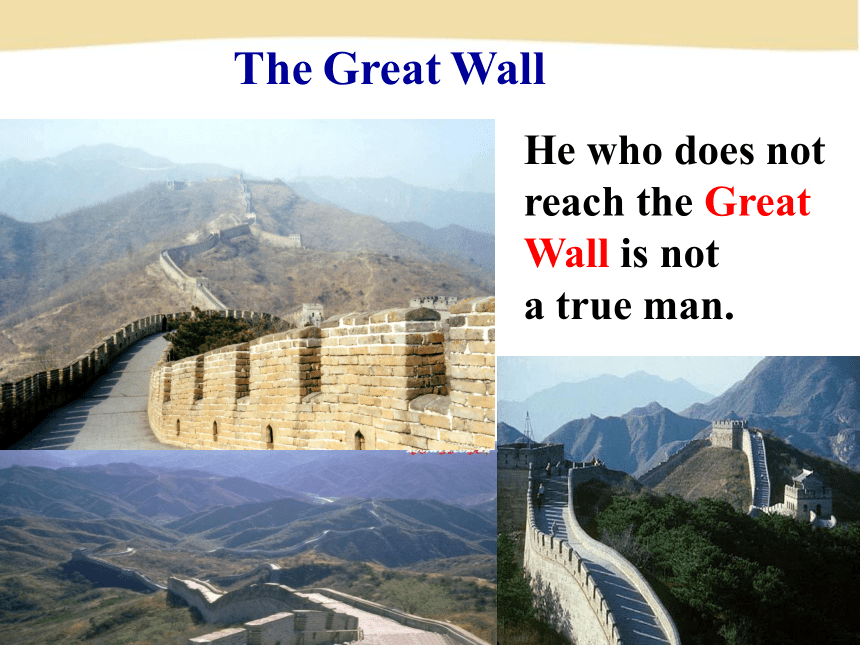
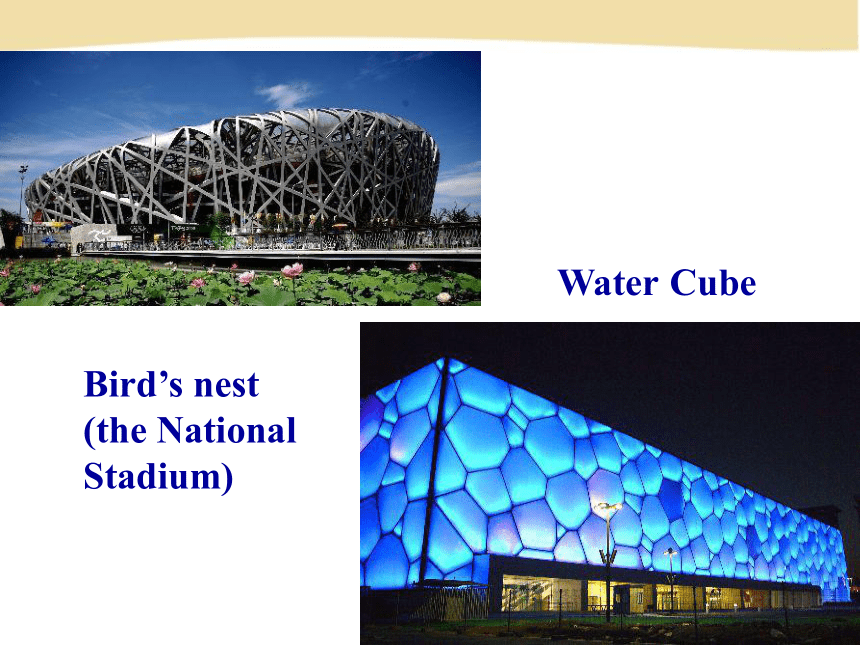

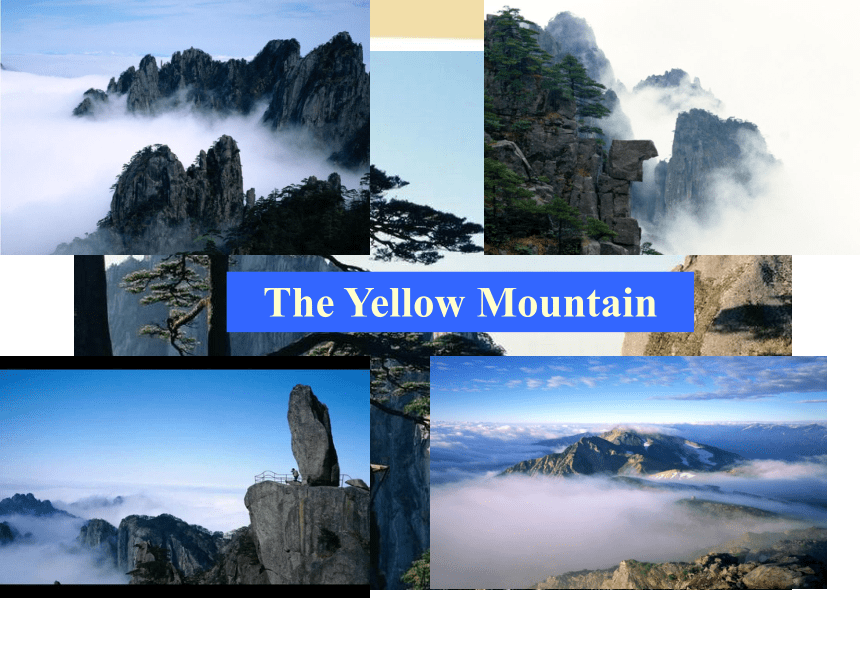

文档简介
(共55张PPT)
Unit 3 Travel journal
Period 1
Warming Up & Pre-reading
学习目标:1. 学会用简单句描述一次旅行计划
2. 了解湄公河
3. 激发对旅游的兴趣
学习重点:学会用简单句描述一次旅行计划
学习难点:学会小组合作,培养合作意识
Travelling widens our view,
increases our knowledge,
and builds our bodies.
旅游可使我们开阔视野,
增长知识, 锻炼体魄。
Lead in
Do you like travelling
Have you ever been to these places
Tian’anmen Square
The Forbidden City
The Heaven Temple
The Summer’s Palace
The Great Wall
He who does not
reach the Great
Wall is not
a true man.
Bird’s nest
(the National
Stadium)
Water Cube
the Terracotta Warriors
The Yellow Mountain
Guilin
in southern China, provides one
of China’s most extraordinary views.
Leshan Buddha
(Sichuan)
Mount Qomolongma
Maldives
Potala Palace
Eiffel Tower
巴黎艾菲尔铁塔
(位于塞纳河南岸)
Mount Fuji
日本富士山
Arc de Triomphe
(凯旋门)
Louvre Museum
(卢浮宫)
the Pyramids
Liberty of Statue
The North Pole
The South Pole
Under the sea
Which kind of transportation
do you prefer to use Why
on foot
by bike
Speaking 1
by motorbike
by bus
by car
by train
by ship/boat/sea
by plane/air
Which kind of transportation
do you prefer to use Why
Sample:
I prefer to use a bike, because it is very
convenient. I can go anywhere whenever
I like.
Where are you going for your holiday
When are you leaving
How are you going there
How long are you staying there
Talk about your travel plan with your partner
Speaking 2
Use these expressions to end your dialogue:
Have a nice/good trip.
Have a good time.
Have fun.
Good luck on your journey.
Take care.
A: Where are you going
B: I’m going to Dali
A: When are you leaving
B: I’m leaving on Oct. 3.
A: How are you going there
B: I’m going there by bike.
A: How long are you staying there
B: About three days.
A: Have a good trip!
B: Thank you!
Sample dialogue
Lan Cang River
The Mekong River
Can you list the countries that the Mekong flows through
China
Laos
Thailand
Cambodia
Vietnam
South China Sea
Myanmar
Unit 3 Travel journal
Period 2
Reading
30
Listen to the tape and get the main idea of each paragraph :
Para.1
Wang Kun and Wang Wei’s dream.
Para.2
Wang Wei is stubborn.
Para.3
Preparing for their trip.
31
Discuss
the text
in details.
32
Who and what
Wang Kun and ___ ____ Wang Wei are dreaming about_____________________.
his sister
taking a great bike trip
33
Where and How
They have the idea to ___ _____the Mekong River from ______ it ______ to _____ it _____.
cycle along
where
begins
where
ends
Read the passage carefully and decide
whether the statements are true or false
and correct
1. Their dream was to go hiking along the river.
2. Wang Kun is a high school student.
3. Both Dao Wei and Yu Hang are Dai and they
grew up in eastern Yunnan Province.
F
Detail reading
F
take a bike trip
F
college
western
4. Wang Wei persuaded their cousins, Dao Wei
and Yu Hang, to join in their cycling.
5. Before flowing in other countries, the Mekong
River is called the Langcang River.
6. The source of the river is in Qinghai Province
and it enters the East China Sea.
T
Detail reading
F
T
South
7. They found few atlas and books about
Mekong River in library.
8. All parts of the Mekong River are in
China.
9. There are no waterfalls in the Mekong
River.
10. You can see glacier, rapids, valleys,
waterfalls and plains along the river.
F
F
F
T
a large atlas
Only part
37
1.What are Wang Kun
and Wang Wei’s idea of a good trip
Their idea was
to cycle along the Mekong River.
38
2. Who planed the trip
to the Mekong
Wang Wei.
39
3. Where is the source of
the Mekong River and
which sea does it enter
The source of the river is in
Qinghai Province and
it enters the South China Sea.
40
4. What can you see when you travel along the Mekong
.
41
What can you see when you travel along the Mekong
It begins in a ______ on a_ _________.
glacier
mountain
42
Then, it______ quickly. It becomes
______ as it passes through deep _____.
moves
rapids
valleys
43
Sometimes, the river becomes a _______ and enters ____ _____.
wide valleys
waterfall
44
At last, the river _____ enters
the South China Sea.
delta
45
4. What can you see when you travel along the Mekong
You can see glacier, rapids ,hills, valleys, waterfalls and plains.
5、What difficulties did Wang Kun and Wang Wei find about their journey
It is hard to breath and cold.
6、What do you think Wang Kun and Wang Wei
Wang Kun: enthusiastic,critical
Wang Wei: organized, stubborn, determined,
Words and phrases
Reading
1. ever since
2. dream about
3. take a bike trip
4. persuade sb to do sth
5. grow up
6. get sb interested in
7. graduate from
8. from… to…
9. be fond of
10. the way of doing sth
自那以后(现在完成时have/has+done
梦想……
骑自行车旅行
说服某人做某事
成长、长大
使某人对某事感兴趣
毕业于
从……到……
做某事的方式
喜欢
Period 2
Reading
11. keep doing sth
12. care about
13. a determined look
14. change one’s mind
15 at an altitude of 1000 meters
15. more than
16. make up one’s mind
17. give in
18. at first
19. be surprised to do sth
20. at last=finally
21.be excited about
不断地做某事
关心、忧虑
坚决的表情
改变主意
超过、不止、非常
下决心、决定
投降、屈服、让步
起初,首先
最后
对做某事感到惊奇
Period 2
在海拔1000米的地方
对....感到激动
Fill in the blanks
Reading
1. grow (v.) 生长,成长,种植
→ _______(过去式) →_______(过去分词)
2. buy (v.) ______ → _______(过去式)
→_______(过去分词)
3. finally (adv.) __________ → _____(adj.)
final exam ____________ finals (n.) 决赛
4. well (adv. & adj.) → ______ (比较级)
→______(最高级)
grew
grown
购买
bought
bought
最后、终于
final
期末考试
better
best
Fill in the blanks
Reading
5.写出本文中出现的-ed类形容词或-ing类形容词
1)_______________________
2)_______________________
3)_______________________
其中-ed类形容词修饰___,-ing类形容词修饰___
6. experience意为“经验”时为(可数 / 不可数)名词;
意为“经历”时为(可数 / 不可数)名词;
experienced是形容词,意为“_______________”
interested --- interesting
excited --- exciting
surprised --- surprising
人
物
有经验的
重点句型:
强调句:
It is/was+ 被强调部分+ that/ who+ 其他
period 3
Reading2
Unit 3 Travel journal
Period 1
Warming Up & Pre-reading
学习目标:1. 学会用简单句描述一次旅行计划
2. 了解湄公河
3. 激发对旅游的兴趣
学习重点:学会用简单句描述一次旅行计划
学习难点:学会小组合作,培养合作意识
Travelling widens our view,
increases our knowledge,
and builds our bodies.
旅游可使我们开阔视野,
增长知识, 锻炼体魄。
Lead in
Do you like travelling
Have you ever been to these places
Tian’anmen Square
The Forbidden City
The Heaven Temple
The Summer’s Palace
The Great Wall
He who does not
reach the Great
Wall is not
a true man.
Bird’s nest
(the National
Stadium)
Water Cube
the Terracotta Warriors
The Yellow Mountain
Guilin
in southern China, provides one
of China’s most extraordinary views.
Leshan Buddha
(Sichuan)
Mount Qomolongma
Maldives
Potala Palace
Eiffel Tower
巴黎艾菲尔铁塔
(位于塞纳河南岸)
Mount Fuji
日本富士山
Arc de Triomphe
(凯旋门)
Louvre Museum
(卢浮宫)
the Pyramids
Liberty of Statue
The North Pole
The South Pole
Under the sea
Which kind of transportation
do you prefer to use Why
on foot
by bike
Speaking 1
by motorbike
by bus
by car
by train
by ship/boat/sea
by plane/air
Which kind of transportation
do you prefer to use Why
Sample:
I prefer to use a bike, because it is very
convenient. I can go anywhere whenever
I like.
Where are you going for your holiday
When are you leaving
How are you going there
How long are you staying there
Talk about your travel plan with your partner
Speaking 2
Use these expressions to end your dialogue:
Have a nice/good trip.
Have a good time.
Have fun.
Good luck on your journey.
Take care.
A: Where are you going
B: I’m going to Dali
A: When are you leaving
B: I’m leaving on Oct. 3.
A: How are you going there
B: I’m going there by bike.
A: How long are you staying there
B: About three days.
A: Have a good trip!
B: Thank you!
Sample dialogue
Lan Cang River
The Mekong River
Can you list the countries that the Mekong flows through
China
Laos
Thailand
Cambodia
Vietnam
South China Sea
Myanmar
Unit 3 Travel journal
Period 2
Reading
30
Listen to the tape and get the main idea of each paragraph :
Para.1
Wang Kun and Wang Wei’s dream.
Para.2
Wang Wei is stubborn.
Para.3
Preparing for their trip.
31
Discuss
the text
in details.
32
Who and what
Wang Kun and ___ ____ Wang Wei are dreaming about_____________________.
his sister
taking a great bike trip
33
Where and How
They have the idea to ___ _____the Mekong River from ______ it ______ to _____ it _____.
cycle along
where
begins
where
ends
Read the passage carefully and decide
whether the statements are true or false
and correct
1. Their dream was to go hiking along the river.
2. Wang Kun is a high school student.
3. Both Dao Wei and Yu Hang are Dai and they
grew up in eastern Yunnan Province.
F
Detail reading
F
take a bike trip
F
college
western
4. Wang Wei persuaded their cousins, Dao Wei
and Yu Hang, to join in their cycling.
5. Before flowing in other countries, the Mekong
River is called the Langcang River.
6. The source of the river is in Qinghai Province
and it enters the East China Sea.
T
Detail reading
F
T
South
7. They found few atlas and books about
Mekong River in library.
8. All parts of the Mekong River are in
China.
9. There are no waterfalls in the Mekong
River.
10. You can see glacier, rapids, valleys,
waterfalls and plains along the river.
F
F
F
T
a large atlas
Only part
37
1.What are Wang Kun
and Wang Wei’s idea of a good trip
Their idea was
to cycle along the Mekong River.
38
2. Who planed the trip
to the Mekong
Wang Wei.
39
3. Where is the source of
the Mekong River and
which sea does it enter
The source of the river is in
Qinghai Province and
it enters the South China Sea.
40
4. What can you see when you travel along the Mekong
.
41
What can you see when you travel along the Mekong
It begins in a ______ on a_ _________.
glacier
mountain
42
Then, it______ quickly. It becomes
______ as it passes through deep _____.
moves
rapids
valleys
43
Sometimes, the river becomes a _______ and enters ____ _____.
wide valleys
waterfall
44
At last, the river _____ enters
the South China Sea.
delta
45
4. What can you see when you travel along the Mekong
You can see glacier, rapids ,hills, valleys, waterfalls and plains.
5、What difficulties did Wang Kun and Wang Wei find about their journey
It is hard to breath and cold.
6、What do you think Wang Kun and Wang Wei
Wang Kun: enthusiastic,critical
Wang Wei: organized, stubborn, determined,
Words and phrases
Reading
1. ever since
2. dream about
3. take a bike trip
4. persuade sb to do sth
5. grow up
6. get sb interested in
7. graduate from
8. from… to…
9. be fond of
10. the way of doing sth
自那以后(现在完成时have/has+done
梦想……
骑自行车旅行
说服某人做某事
成长、长大
使某人对某事感兴趣
毕业于
从……到……
做某事的方式
喜欢
Period 2
Reading
11. keep doing sth
12. care about
13. a determined look
14. change one’s mind
15 at an altitude of 1000 meters
15. more than
16. make up one’s mind
17. give in
18. at first
19. be surprised to do sth
20. at last=finally
21.be excited about
不断地做某事
关心、忧虑
坚决的表情
改变主意
超过、不止、非常
下决心、决定
投降、屈服、让步
起初,首先
最后
对做某事感到惊奇
Period 2
在海拔1000米的地方
对....感到激动
Fill in the blanks
Reading
1. grow (v.) 生长,成长,种植
→ _______(过去式) →_______(过去分词)
2. buy (v.) ______ → _______(过去式)
→_______(过去分词)
3. finally (adv.) __________ → _____(adj.)
final exam ____________ finals (n.) 决赛
4. well (adv. & adj.) → ______ (比较级)
→______(最高级)
grew
grown
购买
bought
bought
最后、终于
final
期末考试
better
best
Fill in the blanks
Reading
5.写出本文中出现的-ed类形容词或-ing类形容词
1)_______________________
2)_______________________
3)_______________________
其中-ed类形容词修饰___,-ing类形容词修饰___
6. experience意为“经验”时为(可数 / 不可数)名词;
意为“经历”时为(可数 / 不可数)名词;
experienced是形容词,意为“_______________”
interested --- interesting
excited --- exciting
surprised --- surprising
人
物
有经验的
重点句型:
强调句:
It is/was+ 被强调部分+ that/ who+ 其他
period 3
Reading2
